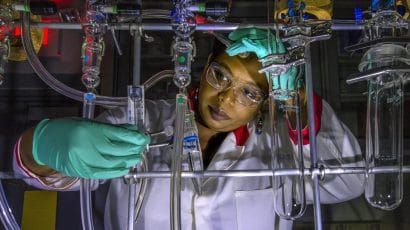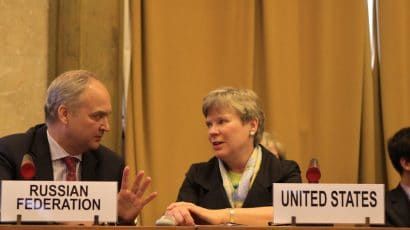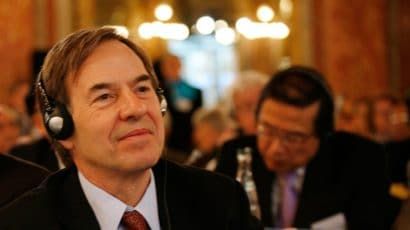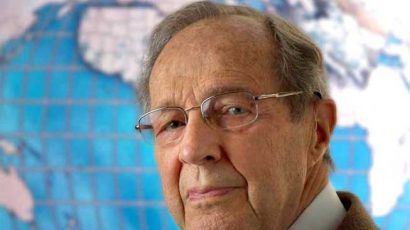Search results for nuclear terrorism
Editor's note: Founded in 1945 by University of Chicago scientists who had helped develop the first atomic weapons in the Manhattan Project, the Bulletin of the Atomic Scientists subsequently created the Doomsday Clock in 1947 using the imagery of apocalypse (midnight) and the contemporary idiom of nuclear explosion (countdown to zero), to convey threats to humanity and the planet.
How China needs to improve its legal framework on nuclear security
On March 31, Chinese President Xi Jinping will be among world leaders attending the fourth and last Nuclear Security Summit in Washington, D.C., where they will try to strengthen nuclear security to deal with the evolving threat of nuclear terrorism. Such efforts are badly needed, in light of the facts that there have been approximately … Continued
How to make sure neutrons save lives instead of end them
Neutrons advance a wide variety of human purposes, including helping to manufacture medical isotopes to treat and diagnose deadly diseases. But highly enriched uranium is used in the production of some medical isotopes, which incurs risk that the material will be diverted or stolen for use in nuclear weapons. To maximize the benefits and minimize the risks associated with using neutrons, we need better international coordination. A regular experts’ meeting at the IAEA is just the place to do it.
Science diplomacy: The essential interdisciplinary approach
A nonproliferation expert explains why success in nuclear diplomacy tends to come in interdisciplinary settings that involve a wide variety of scientists and policy professionals.
Nuclear Security Summit preview: Promises alone won’t keep radioactive sources safe
Why the international community should work toward a binding radioactive sources convention.
Is a nuclear nonproliferation consensus within reach?
Thanks to the participation of Iranian President Mahmoud Ahmadinejad, the eighth conference "to review the operation" of the Nuclear Non-Proliferation Treaty (NPT) is attracting more attention than these affairs usually do. When it concludes on May 28, the NPT Review Conference may not yield a final document expressing the consensus of all 189 NPT member states--but that does not mean the event will be less than spectacular. On only its first day, the conference produced some fireworks.
When national security meets government bureaucracy
Too often Washington confronts its national security challenges by installing a "czar" to knock heads and inspire collaboration among government agencies. Here’s why that approach doesn’t work.
Five minutes is too close
A careful review of threats leads the Bulletin's Science and Security Board to conclude that the risk of civilization-threatening technological catastrophe remains high, and that the hands of the Doomsday Clock should therefore remain at five minutes to midnight.
Pakistan doubles its nuclear arsenal: Is it time to start worrying?
According to recent reports in the New York Times and Washington Post, Pakistan has nearly doubled its nuclear arsenal to more than 100 weapons and appears on track to soon surpass Britain as the world's fifth largest nuclear power.
What is nuclear security worth in 2011?
If the car bomb in Times Square contained just one of the tens of thousands of radioactive sources that exist in the U.S. and it had successfully detonated, this American landmark would be uninhabitable for months or years to come. And, if the attack were with an improvised nuclear device instead, a large portion of Manhattan would have been destroyed. We were lucky in many ways that day, but these are real threats posed by ever-bolder terrorists, and our luck might not last forever.
Bruce Blair: Challenging the accidental nuclear war machine at every turn
With Blair’s death, the nuclear-disarmament movement has lost one of its most learned, creative and persistent leaders. Those of us who have had the privilege of working with him will continue to be inspired by his quiet but dogged and comprehensive commitment to the mission.
Striking a prudent balance: Obama’s Nuclear Posture Review
This month, the Obama administration has greatly accelerated its efforts to reduce nuclear dangers and move all nations toward "the peace and security of a world without nuclear weapons," as President Barack Obama phrased it during his now famous Prague speech.
Extended deterrence and the tactical nuclear mirage
Since the collapse of the Soviet Union, the need to reassure allies has become, perhaps by default, one of the more important rationales for continuity in U.S. nuclear posture. In fact, a view frequently expressed by current and former U.S. officials holds that Washington still maintains the largest strategic nuclear arsenal in the world precisely to provide these assurances.
Nuclear myths (and realities)
As the Obama administration contemplates further changes to US nuclear policy and posture in its second term, it will no doubt encounter opposition from those who argue that the world is too dangerous and complex to permit further reductions in US and global nuclear force levels. Critics will make many assertions in support of their case, but two claims in particular are likely to underpin their defense of the status quo.
A culture of security: Focus for the next Nuclear Security Summit?
With planning for the 2016 event under way, a new tack needs to come to the fore.
Charting a path toward eliminating nuclear weapons
The recognition of the need for nuclear disarmament and the question of how to achieve it are as old as the nuclear age. In June 1945, before the first nuclear weapon had been built, in what became known as the Franck Report, a group of scientists working on the U.S. atomic bomb program warned that:
Nonproliferation across the generations
A pioneer of nuclear nonproliferation passes on, but the work of nonproliferation must endure.
The world must abolish nuclear weapons
At the June 18 ceremony to commemorate the 20th anniversary of the last nuclear test at Semipalatinsk, the site of hundreds of Soviet-era nuclear tests, Kazakh President Nursultan Nazarbayev proposed that August 29--the day of the very first nuclear explosion at the site--should be declared by the United Nations as the "World Day of Renouncing Weapons of Mass Destruction."
U.S. Evangelicals join the nuclear-weapon-free world movement
Though many might imagine faith and science as incompatible, religion and atomic science, at least, are natural bedfellows. Both lead their truest devotees into a troubled insomnia, staring wide-eyed at dark ceilings as undeniably existential matters banish any thought of sleep. The first nuclear test was itself an oddly syncretistic undertaking--bearing the moniker of the Christian Godhead, Trinity; recounted by J.
SecDef19 to chair Board of Sponsors
Former Secretary of Defense William J. Perry to chair the Bulletin's Board of Sponsors.




